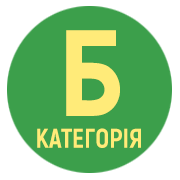FORMATION OF THE TERMINOLOGICAL APPARATUS OF LAND KNOWLEDGE IN THE PROCESS OF SCIENTIFIC ANALYSIS AND PREPARATION FOR THE DEVELOPMENT OF PROFESSIONAL TASKS OF FUTURE SPECIALISTS
Abstract
The article provides a theoretical understanding of the new level of scientific problems of the formation of the terminological apparatus of earth science in the process of scientific analysis and preparation of future professions of fakivts. A methodical planting of the formation of a terminological apparatus in the field of soil science has been identified. Scientific research and literature have been analyzed regarding methods and approaches to the development of the terminology of geological studies. The role of scientific analysis in the management and optimization of the process of forming a terminological apparatus, and itself: the standardization of terminology, which allows the key terms to be defined and ensures a clear understanding of Their significance, and the ease of splicing between fakhivtsy; adaptation to new types and methods that can lead to updating or expanding the terminological apparatus; the uniqueness of synonymy and confusion that can arise through the use of different terms to designate some and understand them, or through unclear meanings; ensuring accuracy and reasonableness; Optimization of the terminological apparatus can accommodate the development of knowledge of the field, growing interest in research in this area and the promotion of new approaches to practice. It has been proven that the formation of a terminological apparatus in the course of earth science is a system that is an integrative unit of such warehouses: learning the basics to understand; understanding of mutual relations; practical skills; increased knowledge; stagnation of interdisciplinary knowledge. The interrelationships between the formation of the terminological apparatus and the successful development of professional tasks in the field of soil science, agronomy, geodesy and land management are established. It is emphasized that the terminological apparatus of geosciences allows students to develop complex strategies in the field of agronomy and geodesy, which correspond to the current market and their success. Its professional integration, after completion of training, provides the necessary tools for effective work, allows new facists to clearly communicate with colleagues, understand scientific literature and identify various analytical works, identify problems in earth sciences and develop effective solutions for their rigor, clarity and unification of terminology with accepts the accuracy and reliability of tracking results, respecting professional status.
References
2. Амеліна С. М. Теоретико-методичні основи формування культури професійного спілкування студентів вищих аграрних навчальних закладів : автореф. дис. на здобуття наукового ступеня доктора пед. наук : 13.00.04 «Теорія і методика професійної освіти». Харків, 2008. 40 с.
3. Безгодова Н. Співвідношення понять термінологія – професіоналізм – номенклатура. Вісник Львівського університету. Серія Філологія. 2004. Вип. 34. Ч. І. С. 458–463.
4. Бондаренко Г. П. Методика навчання студентів економічних спеціальностей української наукової термінології в умовах східного регіону України : автореф. … дис. канд. пед. наук: 13.00.02. Київ, 2008. 30 с.
5. Власюк І. В. Формування професійно-термінологічної компетентності майбутніх бакалаврів економіки в процесі вивчення фахових дисциплін : автореф. … канд. пед. наук. Вінниця, 2015. 20 c.
6. Дзюбата З. І. Формування комунікативних умінь майбутніх аграрників у процесі інтеграції навчальних дисциплін : дис. … канд. пед. наук : 13.00.04. Тернопіль, 2012. 245 с.
7. Коваль В. О. Теоретичні і методичні засади формування професійної компетентності майбутніх вчителів філологів у вищих педагогічних навчальних закладах: монографія. Умань : ПП Жовтий О. О., 2013. 455 с.
8. Кручек В. А. Формування комунікативних умінь студентів вищих аграрних закладів освіти в процесі вивчення психолого-педагогічних дисциплін : автореф. дис. на здобуття наук. ступеня канд. пед. наук : спец. 13.00.04 «Теорія і методика професійної освіти». Київ, 2004. 19 с.
9. Огар Е. І. Українська видавнича термінологія: нормалізаційні та функціональні аспекти. Українське журналістикознавство. 2009. Вип. 10. С. 31–35.
10. Оніпко В. В., Ласло О. О., Калашник О. П. Формування у майбутніх агрономів понятійно-термінологічного апарату при вивченні освітнього компонента Ґрунтознавство. Сучасні тенденції підготовки майбутніх фахівців у закладах професійної (професійно-технічної), фахової передвищої та вищої освіти : матеріали всеукр. науково-практ. інтернет-конф., (м. Полтава, 24–25 трав. 2023 р). Полтава : ПДАУ, 2023. С. 150–153.
11. Оніпко В., Нечипоренко Н., Поспєлова Г. Формування термінологічного апарату як важливий методичний складник підготовки з курсу Агрофармакологія. Актуальні питання забезпечення якості вищої освіти : матеріали 55-ї науково-методичної конференції викладачів і аспірантів. Полтава : ПДАУ, 2024. С. 52–56.
12. Онуфрієнко Г. С. Науковий стиль української мови: навч. посіб. з алгоритмічними приписами. 2-ге вид. перероб. та допов. Київ : Центр учбової літератури, 2009. 392 с.
13. Ракшанова Г. Ф. Професійна термінологія як засіб формування мовленнєвої компетенції майбутнього фахівця. Міжнародна конференція «Сучасний університет: перспективи розвитку». Черкаси, 2010. С. 125–127.
14. Садовнікова Г. В. Співвідношення категорій концепт, поняття і значення у когнітивному термінознавстві. Вісник КНЛУ. Серія Філологія. 2014. Т. 17. № 1. С. 156–164.






